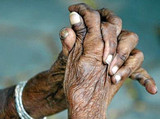
The prejudice allegedly displayed at the wedding was more a reflection of India’s divisions than our own.
The dust is starting to settle around the Gupta jet-landing scandal earlier this month, but an ugly issue remains, needling us like an old wound.
It was the claims of racism that occurred during the wedding: Indian guests allegedly preferring white staff over black and insulting black staff at Sun City by asking them to clean themselves, implying that they were dirty.
In post-apartheid South Africa, we hurt easily where race is concerned. The treatment black workers were said to have been subjected to is reminiscent of the allegations of racism that have long stalked the Indian community, particularly in KwaZulu-Natal.
One person let rip at Indian South Africans on Twitter, following the incident with the Guptas.
“Reality check: You were never part of the struggle & you never worked hard. The British gave you all that you have!” tweeted a scornful Phumlani Mfeka.
The treatment of domestic workers, gardeners and other staff working for Indian families and businesses is a sore point. Although white-on-black racism, or its reverse, usually dominates the conversation in South Africa, Indian-on-black prejudice is an issue that has also come to the forefront at various times in our democratic history.
The issue was the subject of Mbongeni Ngema’s AmaNdiya song in 2002, in which Ngema tapped into the discontent of black South Africans living in Durban, where Indian people are a sizeable part of the population.
But that was 11 years ago. The majority of Indian South Africans today consider themselves just that: people of Indian descent who call South Africa home, some for as many as seven generations. The ANC is often the first to defend the country’s Indian population, pointing out its role in the struggle — even if some critics have questioned that role — and Nelson Mandela asked Ngema to apologise for the song.
Though some Indian people enjoyed the special treatment meted out by the apartheid government in an attempt to “divide and rule”, a sizeable and influential group rebelled and joined forces with the ANC to lead the country to liberation.
Of course, old prejudices clung in some quarters, but these days, most Indian South Africans, particularly young, urban ones, would sooner challenge someone on their racism towards black South Africans than be part of it themselves.
Ultimately, Indian South Africans are like any other South Africans — and indeed human beings. Some are open-minded, some are not, some have fought against racism with all their might, and some are racist themselves. There is not a particularly higher incidence of racism among the Indian community, I would imagine.
Indeed, the Reconciliation Barometer of 2012 found that Indian South Africans were the most likely to socialise across the racial divide and scored the highest on every question where racial integration was concerned.
A separate problem, however, is the attitude of people from India towards African people and indeed how incredibly divided that country’s own society is. I suspect the Guptas, who have been living in Africa for a decade, probably forgot how bad racism is among people from India. The problem is a notorious one and, in 2011, there was a minor outcry when some black students were barred from bars in the country.
On a recent holiday in India, I cringed when people stared at my black travelling companion, a subject that many have written about.
On other trips there, I’ve always been very aware that I am usually the darkest person in any group: anyone who looks like me is likely to be serving us. Colour is an issue on the great subcontinent, in all its shades, and racism is directed towards black people who are subconsciously slotted among the lowest-ranking castes.
I wish I could say that the Gupta saga will force Indian people to take a look at their own racism, but the fact is that the story hardly caused a ripple there. The Guptas may be big fry here, but in India they don’t register on the national agenda.
It is a conversation that people in India need to have themselves, but it is a conversation still in its infancy as India’s approximately one billion people still battle to deal with their own intra-race problems.
And it is that thought that oddly makes me proud: South Africans of Indian descent have been talking and sensitising themselves to these issues for generations, ever since the first indentured labourers were brought over in tumultuous ships that threw different castes together and forced them to eat together, rendering the strict divisions of Indian society redundant and, indeed, absurd.
We are far ahead in our conversation about unity as South Africans. And for that I’m grateful.
Verashni is the deputy editor of the M&G Online. She studied at Rhodes University. Read her weekly column and follow her on Twitter @verashni
Caption: Dark truth: The alleged hostility of wedding guests to black staff is part and parcel of India’s overt colour prejudice.
Photo: Noah Seelam/AFP
Source: Mail & Guardian
